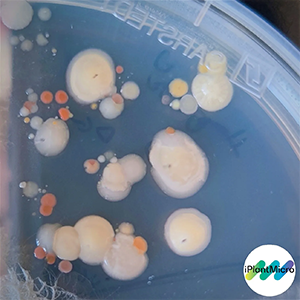Plant-Microbiome Interactions
Presentation

Our goal in iPlantMicro Lab is to understand the communication systems
in plant-microbe beneficial interactions, to use them as a support in agriculture management.
Our social media and contact
We really think it's very important to share how is the life in lab for the future new researchers, so you can find our adventures on Twitter, Instagram, YouTube and TikTok! Just follow us in @iPlantMicro or clicking in each icon! We are also happy to answer any question by e-mail: nacho.vilchez@itqb.unl.pt
Framework
 Agriculture is the main pillar in human feeding, particularly considering a growing population. However, the current scenario of climate change is conditioning soil health (salinization, degradation and desertification) and, consequently, plants productivity. Conventional approaches have been shown less and less efficient, so in order to solve the problem of supply in the coming decades, we need to face this situation in a more environmentally contextualized manner. In this regard, rhizosphere microbiota condition soil fertility and health, as well as influence on the plant growth and development. Among them, many strains are beneficial in agriculture, enhancing nutrient availability and plant response to environmental stresses. Therefore, the main goal of my research is to unravel the rhizosphere signaling and interaction mechanisms of this beneficial microbiota.
Agriculture is the main pillar in human feeding, particularly considering a growing population. However, the current scenario of climate change is conditioning soil health (salinization, degradation and desertification) and, consequently, plants productivity. Conventional approaches have been shown less and less efficient, so in order to solve the problem of supply in the coming decades, we need to face this situation in a more environmentally contextualized manner. In this regard, rhizosphere microbiota condition soil fertility and health, as well as influence on the plant growth and development. Among them, many strains are beneficial in agriculture, enhancing nutrient availability and plant response to environmental stresses. Therefore, the main goal of my research is to unravel the rhizosphere signaling and interaction mechanisms of this beneficial microbiota.
To this end, analysis of changes in microbiota populations is necessary to elucidate which mechanisms are acting as recruiting and selectors for beneficial strains with interest in stress managing and plant production. Thus, we will perform coherent studies of stress-induced root exudates effects on natural and synthetic microbiota (by metagenomic, culture-based methods), supported by transcriptomic, metabolomic and phenotypic approaches. Additionally, we will apply innovative in vitro/in planta test involving fluorescence-tag tracking and fingerprinting methods for monitoring vertical transmission and inheritance of beneficial microbiota as a hardening treatment for next generation crops. Considering previous analyses and knowledge background in our group, Fabaceae and Solanaceae plants will serve as model plants to assess the effectiveness of these approaches and new generation treatments based on beneficial microbiota bioengineering tools.

Lab team - Spring 2024


Lab team - Summer 2023 Lab team - Spring 2022






